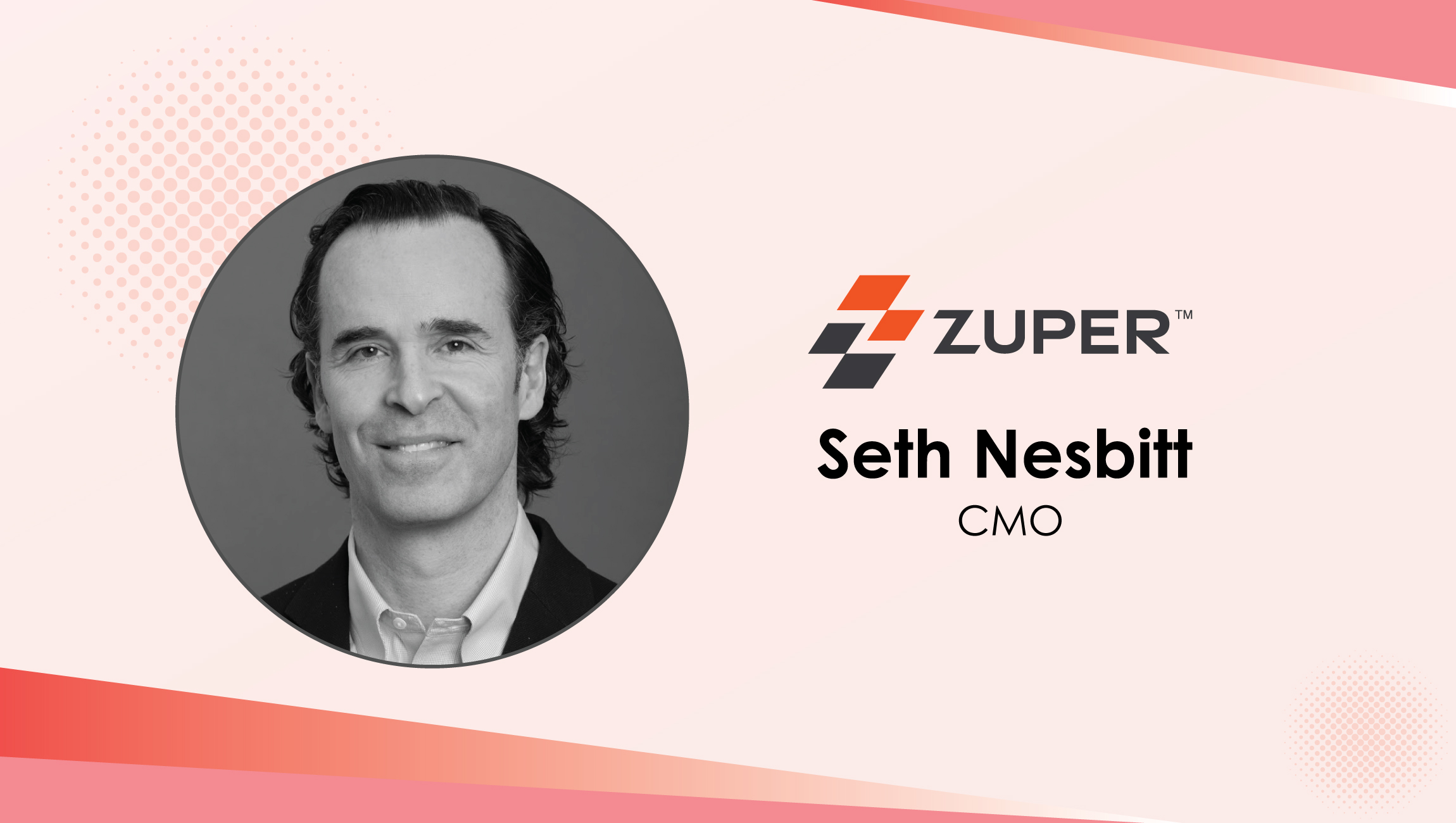Seth Nesbitt, CMO at Zuper comments on the latest gaps in B2B tech marketing in this martech catch-up:
Tell us about your marketing journey in the B2B SaaS market and more about what you’re looking forward to as Zuper’s new CMO?
I have spent the majority of my career in senior-level marketing and sales roles at B2B SaaS companies that span several verticals (legal, energy, hosting and telecom) and love learning the ins and outs of new sectors and segments. SaaS CMOs can apply a lot of core marketing principles across industries, but I am eager to dive specifically into the world of field service management during this phase of Zuper’s journey. Zuper is a dynamic growth-stage company with a highly differentiated product in an industry that is undergoing significant digital innovation. There are a lot of opportunities ahead to raise our brand awareness and market position. Lastly, I most look forward to working alongside the talented and dedicated team at Zuper who have built and scaled such a great business!
What would you say are the top issues in today’s state of B2B tech marketing that need a complete overhaul?
Generally, the top issues facing B2B tech marketing center on data (something that impacts all marketers today). This includes the quality of data, integration of multiple data sources, data privacy and security, etc. Cross-channel attribution is also a big challenge and needs to be completely rethought. I see a lot of people getting tripped up on attribution (measuring the contribution of different channels to pipeline and revenue). I think the right approach has always been to view attribution data and analysis as an important component of decision-making but not the only or final answer. Even advanced attribution models (multi-touch, weighted, time decaying, etc.) are best at indicating relative value and performance but are not absolute.
As a marketing leader: what are some of the proven core marketing strategies (ABM etc) that you’ve relied on to drive impact?
The key to a successful marketing strategy, regardless of the tech stack or tools used, is the people who are implementing it. Hiring, retaining and motivating great people results in innovative strategies at the center of any marketing initiative. One of my core principles is keeping an open mind when joining a new company – while I may have playbooks that I have used before, I believe that at the beginning it is important to learn what has made the current organization successful. Only then will I consider whether or not a different approach is relevant – regardless of whether I have used it in my prior experience or not.
Marketing Technology News: MarTech Interview with Carlos Aragon, Senior Director, Product Marketing @ Vonage
How can tech marketing teams create more noise in a crowded digital market, can you throw light on some marketing tactics of top SaaS brands that have piqued your interest and why?
As a particular market gets more crowded and noisy, I think the best strategy to stand by is going back to basics – like delivering valuable content and innovative experiences. This content can be very simple like the way Square shares short 30-second customer testimonial videos that capture the value of its solution. On the innovative side, no-code software company Creatio held an event on a mountaintop with a DJ to introduce its latest platform update. B2B buyers are empowered to – and many times want to – find out nearly everything themselves and we need to help them do just that! In terms of other brands doing well, I have loved what HubSpot has been doing with its various community and free education offerings – really original stuff and valuable resources for its audiences.
How can tech CMOs drive more unification of different marketing mediums (social media, email, podcasts, events etc). What practices help to effectively measure ROI from each?
As with B2C marketing, SaaS CMOs need to think about and deliver consistent cross-channel experiences. This means approaching personalization not as a one-off tactic but as a strategy that encompasses every touchpoint and provides a unified experience for the customer. It’s easy to forget that B2B buyers are consumers too. CMOs can – and should – leverage software-enabled tools and work alongside RevOps teams to measure as much as possible to deliver valuable data and insights to the marketing teams and sales teams. However, there is also value in returning to a version of marketing where there is a reliance on “self-reported source” metrics, which many of us have been avoiding for years. These metrics capture influence that otherwise is hard or difficult to capture, providing a more holistic view of the overall marketing campaign.
Can you take us through the martech you’ve relied on to drive results?
Ah, the “What is your preferred tech stack” question! I will say upfront that as with all business objectives, success and results stem from optimizing people, processes and technology. Martech, no matter how good, is still just technology. For a CMO or senior B2B SaaS marketer, spending time building and coaching your team, setting clear objectives, and documenting processes are just as (if not more) important than the underlying tech! The best tech will not solve bad culture, unclear goals and ill-defined processes. I think marketers have become over-reliant on tech and we need to get back to marketing fundamentals. Once you prove new marketing tactics and strategies to be effective (email, social, digital ads, etc.), then you can make smart tech investments to scale. That said, I have been very impressed with what I’ve seen from HubSpot lately and recommend to many B2B CMOs who haven’t reviewed their capabilities in a while to take a look!
Marketing Technology News: Mastering First-Party Data Part 1: 5 Tactics that will take you from zero to hero
Zuper empowers fast-growing service businesses to scale and modernize their field operations with the industry’s most comprehensive, flexible, and customizable field service management solution. Zuper’s platform integrates seamlessly with industry-leading apps and CRMs and comes with personalized support, as well as robust reporting and analytics. Thousands of users globally rely on Zuper’s automated workflows to enable field workforce collaboration and deliver their customers the best possible experience. Operating since 2020, Zuper Inc. is headquartered in Seattle with offices in India.
Seth Nesbitt is the CMO of Zuper. He has over 20 years of experience in B2B software and technology-enabled solutions, and his background includes corporate strategy, enterprise sales, product marketing, product management, client management, and regional/field marketing. His domain expertise is in enterprise software, AI-ML, SaaS, energy and sustainability, IoT, telecommunications, cloud computing, cloud services, IT Services, and contract lifecycle management. He is passionate about building teams that embody excellence, innovation, and collaboration to empower employees, customers, and partners to achieve their goals.











